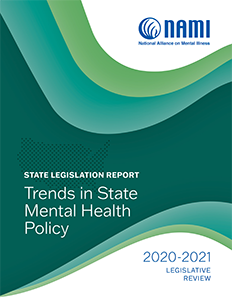The report explains key trends in mental health policy and offers lessons from NAMI State Organization leaders who played important roles in shaping some of these policies.
The report’s analysis is divided into three main sections based on the topic area pillars of the NAMI 2020-2025 Strategic Plan: people should get help early, get the best possible care and be diverted from criminal justice system involvement.
Areas of focus covered in the report include:
- Early intervention
- School mental health
- Mental health and substance use parity
- Medication access
- Service expansion
- Inclusive and culturally competent care
- Crisis response
- Diversion
- Rehabilitation and reentry
Due to the breadth of issues impacting mental health, this report is not comprehensive of all possible issue areas and related legislation.
CONCLUSIONS
Mental health was front and center in states’ policymaking in 2020 and 2021, following a trend in recent years that was accelerated by concerns related to the COVID-19 pandemic. Progress was made in a variety of issues such as:
- Addressing the needs of youth
- Strengthening the implementation of both federal and state parity requirements
- Making more telehealth options available
- Building a comprehensive behavioral health crisis care system
- Reducing justice system involvement for people with mental illness



